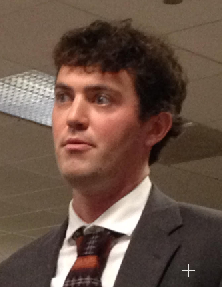Graham Bowman, CCH’s youth health attorney, requested a state hearing on proposed changes to the state appeals process for poor people who are denied public benefits, including Medicaid. His August 26 testimony can be read here.
By Maudlyne Ihejirika
Debra Hamilton and her disabled daughter were among dozens of critics of proposed changes to Illinois public aid rules at a Department of Human Services hearing on Wednesday.
The Rauner administration is seeking to revise the appeals process for those denied or terminated from aid programs including Medicaid, Supplemental Nutrition Assistance Program and Temporary Assistance for Needy Families.
A slew of advocates and attorneys for the elderly, disabled and poor pointed out legal issues with section after section of the proposed rule changes.
“The proposed rules dramatically limit the rights of people who are applying for benefits, which flies in the face of federal law. They are very similar to recent rule changes that were struck down by the U.S. Supreme Court as a violation of due process,” said Anthony Ferraro, president of the Illinois Chapter of the National Academy of Elder Law Attorneys.
Speakers such as Hamilton, 53, of Aurora, whose daughter Sarah suffers from epilepsy and autism and is legally blind and cared for at home, spoke about the potential effect on lives.
“I took the time to read and re-read this. Among the more glaring errors is a shift in responsibility in the ‘burden of proof’ sections, and I’m shocked by the dozens of times that I saw the words ‘fair’ or ‘impartial’ stricken,” Hamilton said, as Sarah and her seeing-eye dog, Jordan, looked on. “I urge you to sustain access to care for people like my daughter.”

As with the Rauner administration’s proposed changes to child care eligibility rules, advocates across the state have sounded an alarm over the DHS changes.
DHS spokeswoman Veronica Vera declined to respond to criticism of the proposed changes made at the hearing, conducted by a DHS attorney, at 160 N. La Salle. In an email, she wrote only: “DHS held a public hearing at the request of members of the community over federally mandated rule changes.”
Critics who spoke at the hearing included groups such as the Sargent Shriver National Center on Poverty Law, which has sued the state to force Medicaid payments during the budget stalemate, the Office of the Cook County Public Guardian, and Access Living.
Their complaints included proposed new limits to what can be appealed; how appeals can be initiated; the time period to appeal; limits to locations where appeal hearings can be held; who can represent applicants at hearings; and limits to access of DHS records for the purpose of appeals.
“Anyone who has ever tried to call a DHS office knows how difficult it is to get someone on the phone. The only way you’re guaranteed to do that is by filing an appeal,” said Graham Bowman of the Chicago Coalition for the Homeless, which requested the DHS hearing. “These rules are going to make obtaining public benefits a lot more difficult and burdensome.”
State Rep. Greg Harris (D-Chicago), who sits on the Joint Committee on Administrative Rules, which ultimately must approve the changes, said he was disheartened by what he heard at the hearing.
“If I was the average citizen or family, I’d be scared to death. This is the bureaucrats’ dream,” said Harris, shaking his head. “DHS is saying, ‘We’ll make a decision. You’ll have 10 days to gather your documents. You may have to drive to a whole different city for a hearing. And if you do one thing wrong, you lose.’ You simply can’t pass something that will have a disparate impact on the elderly and disabled.”
